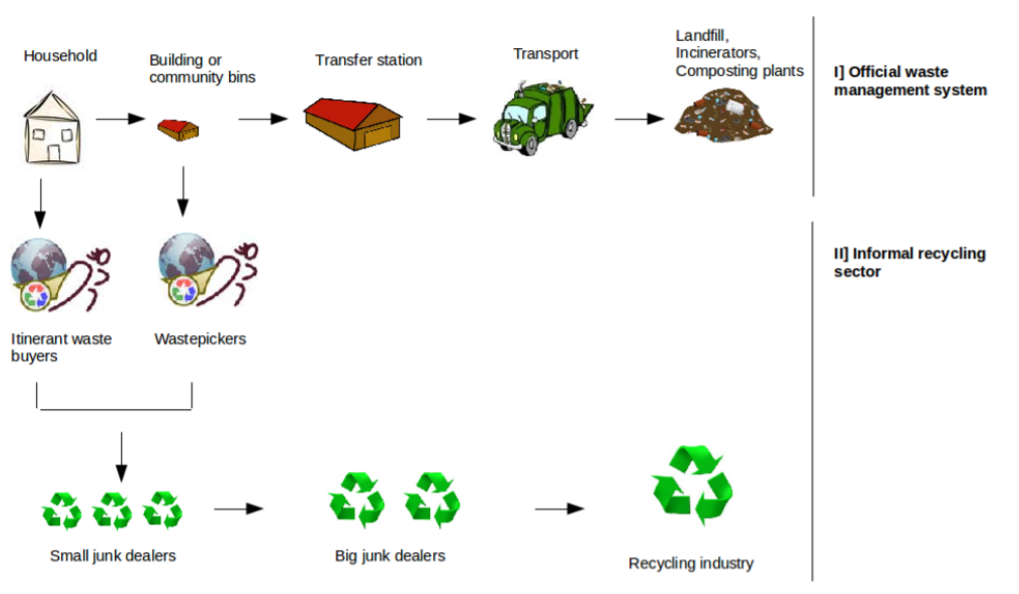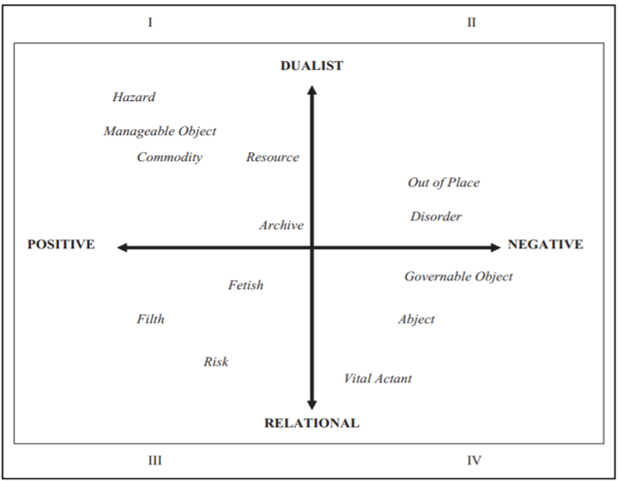In an older post, we looked at how Beijing’s air pollution woes could have been used to target unwelcome rural migrants. In this penultimate post, let us explore the variegated meanings of waste through examining the work of the city’s waste pickers, most of which are migrants.
A flourishing informal waste recycling industry
Beijing has been producing growing volumes of waste in recent years. In 2018, its residents produced 9.29 million tonnes of household waste, a 43.3% increase compared to that for 2012.

Supplementing the city’s formal MSW management system is a sizeable informal waste collection and recycling industry mostly powered by rural migrants. One role they play is the job of waste pickers (Landsberger 2019). Estimates suggest that there are roughly 200 000 informal waste collectors in Beijing, who collect around 30% of MSW produced.


The job of waste pickers follows a pattern of collect-sort-sell. They first collect rubbish through a variety of means; some search through community bins, some buy recyclables from district residents they have cultivated a relationship with, while others have agreements with businesses. They then sort the waste for sale to junk traders or recyclers (Pla 2015; Wu and Zhang 2019).
Beyond just trash
If you were to look up the meaning of waste in a dictionary, you would most likely come across a definition that looks something like this entry from Cambridge Dictionary: ‘unwanted matter or material of any type, especially what is left after useful substances or parts have been removed’.
But UPE’s readings of waste give it more meanings, as Moore (2012: 782) details:

Building a life on waste
Through the labour input of waste pickers, trash is transformed into a resource (Moore 2012). The act of sorting through garbage identifies those with resale value, with assessments made based on knowledge regarding what junk traders want (Wu and Zhang 2019). This process ascribes economic value to waste, which is subsequently realised when waste pickers receive payment in return for the sale of sorted waste. We can see this as a second stage of “sorting” post-consumption. The first stage takes place where the trash is “produced”, such as in the homes of households, where objects deemed to be of little value and to be sold to waste pickers are relegated (set aside) in a pile – a symbol of its lack of worth in the eyes of the household. As waste pickers work, they extract value previously untapped or unseen by the households “producing” this trash. The value of waste as a resource, then, is realised through waste pickers’ work in sorting and selling trash (Samson 2015).

In turn, waste represents a valuable source of income, and correspondingly a chance at upward socio-economic mobility for waste pickers. Many, like Mr and Mrs Ma in the video above, simply want a shot at a more comfortable life through waste picking (Wu and Zhang 2019). But stories of waste pickers who became the ‘King of Glass’, ‘King of Plastic’, or ‘King of Iron and Aluminium’, who managed to set up large-scale recycling stations in Beijing are also abound within the waste picking community, encouraging bigger ambitions in some (Landsberger 2019).
Waste and the body
Waste can also be seen as filth. This perspective casts waste as fundamentally abhorrent and therefore capable of invoking strong responses (Moore 2012). In a blurring of boundaries between the material ‘filth’ that waste pickers deal with and the bodies of waste pickers themselves, aversion towards waste then gets passed onto the waste pickers who are seen to embody the filth of the trash they collect and sort. Waste, and by extension the waste pickers associated with it, becomes ‘matter out of place’ (Douglas 1966: 36) due to the filthiness it is characterised by. Douglas writes that ‘dirt … is a relative idea’ (ibid.) – things become dirty when they disrupt what we see as clean. In this, waste becomes abject (Moore 2012) – an entity capable of characterising a certain social group as undesirable (“dirty”) because of its relation to waste.
This can be seen in Beijing, where there is significant stigma associated with waste pickers. They are seen by some to carry with them the stench and dirtiness that their work entails, and thus seem to fit poorly with the image of the city as sophisticated and developed (Landsberger 2019; Wu and Zhang 2019). Being profoundly aware of this, the waste pickers mainly mix with fellow waste pickers (Wu and Zhang 2019).
Waste and the urban lived experience
Our look at the work of waste workers has surfaced how waste and the bodies coming into contact with them are inextricably intertwined as they shape how the other is constructed. In different meanings of waste, we find that it is simultaneously socially produced by and a producer of the urban. This is perhaps a timely point for us to stop and reflect on whether we can find more value in the things we plan to throw away, as well as how we can reduce the prejudices that many toiling in informal and/or seen to be “dirty” industries face despite their work in keeping our cities going.
List of References
Douglas, M. (1966) Purity and Danger, New York: Routledge.
Landsberger, S. (2019) Beijing Garbage: A City Besieged by Waste, Amsterdam: Amsterdam University Press.
Linzner, R. and Salhofer, S. (2014) ‘Municipal solid waste recycling and the significance of informal sector in urban China’, Waste Management & Research, 32, 9, 896-907.
Moore, S.A. (2012) ‘Garbage matters: Concepts in new geographies of waste’, Progress in Human Geography, 36, 6, 780-799.
Pla, M. (2015) ‘Municipal Solid Waste Management in Beijing’, Field Research Working Paper.
Samson, M. (2015) ‘Accumulation by dispossession and the informal economy – Struggles over knowledge, being and waste at a Soweto garbage dump’, Environment and Planning D: Society and Space, 33, 5, 813-830.
Steuer, B., Ramusch, R., Part, F., and Salhofer, S. (2017) ‘Analysis of the value chain and network structure of informal waste recycling in Beijing, China’, Resources, Conservation and Recycling, 117, Part B, 137-150.
Wang, H. and Wang, C. (2013) ‘Municipal solid waste management in Beijing: characteristics and challenges’, Waste Management & Research, 31, 1, 67-72.
Wu, K. and Zhang, J. (2019) ‘Living with Waste’, China Perspectives, 2019-2, 67-74.
A really interesting approach to waste in Beijing. You use diagrams in order to supplement your analysis whilst importantly addressing both formal and informal methods of waste disposal, giving us a good overview of the city’s metabolic waste flows. Perhaps a consideration of alternative readings that outline informal waste pickers such as Björkman’s work may provide an interesting comparative case study that displays the true value of the informal sector as I feel you only touch on their importance briefly. I look forward to next week’s blog!
LikeLike
Hi, a great post. Really well written. I think your analysis at the end was particularly poignant regarding the cultural significance of waste and disregard for people who process waste, despite their jobs being absolutely essential to a functioning city. I really enjoyed the use of graphs/ visual aids throughout the post too, it makes for a really engaging read.
LikeLike